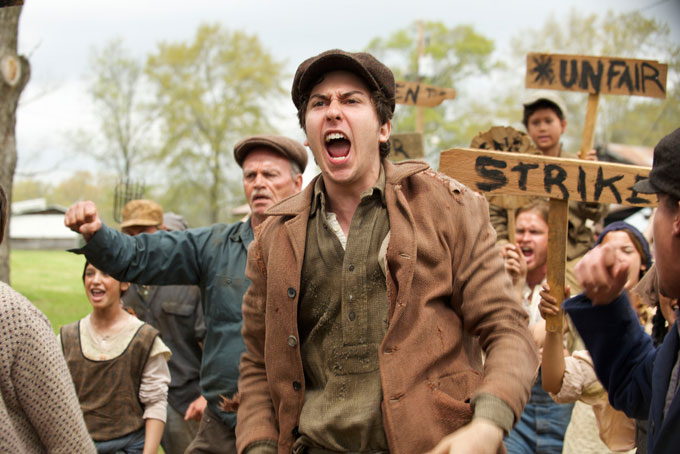 Movie reviews, like book reviews, sometimes influence audience behavior. But as John Steinbeck proved, loyal fans often ignore reviews if they really like an author or an actor. When James Franco’s motion picture adaptation of In Dubious Battle is released in the U.S. later this year, it’s doubtful that fans of Steinbeck or Franco will be affected one way or the other by the breathless reviews and red carpet hoopla In Dubious Battle received at film festivals in September. Reviews were mixed following the movie’s premiere at the Venice Film Festival, but Franco won points for making the first motion picture adaptation of Steinbeck’s 1936 strike novel, and that may be what fans appreciate most when they see the movie for themselves.
Movie reviews, like book reviews, sometimes influence audience behavior. But as John Steinbeck proved, loyal fans often ignore reviews if they really like an author or an actor. When James Franco’s motion picture adaptation of In Dubious Battle is released in the U.S. later this year, it’s doubtful that fans of Steinbeck or Franco will be affected one way or the other by the breathless reviews and red carpet hoopla In Dubious Battle received at film festivals in September. Reviews were mixed following the movie’s premiere at the Venice Film Festival, but Franco won points for making the first motion picture adaptation of Steinbeck’s 1936 strike novel, and that may be what fans appreciate most when they see the movie for themselves.
Reviews were mixed following the movie’s premiere at the Venice Film Festival, but Franco won points for making the first adapatation of Steinbeck’s 1936 strike novel.
Franco reread In Dubious Battle while rehearsing the role of George for the Broadway stage revival of Steinbeck’s 1937 play-novella Of Mice and Men, which has been filmed twice despite being, in Franco’s view, far less suited for the screen than the earlier book. During a press conference at the Deauville Film Festival following Venice, he explained that he decided to make In Dubious Battle now because “as a storyteller [I knew] it would make a great movie” and because its “central conflict had a topical resonance” he felt audiences would understand. That point seemed lost on critics at the Venice Film Festival: some got facts wrong about the novel; others ignored Franco’s intentions and concentrated on his personality and appearance. The response from critics may be more discerning when Franco’s movie opens at the film festival in Toronto, where reviewers won’t have to explain Steinbeck’s story to readers, or the parallels between Steinbeck’s time and today.
Rebel with a Cause: Filming Faulkner and Steinbeck
 Whatever the final verdict on the film, Franco also deserves credit for both directing and acting (as Mac) and for attracting an amazing cast, including Bryan Cranston, Vincent d’Onofrio, Robert Duvall, Ed Harris, Sam Shepard, Selena Gomez, and Natt Wolff. Franco has appeared in dozens of movies, and he’s best known by mainstream moviegoers for playing slapstick characters in Animal House pictures like The Interview. But he has portrayed intelligent characters intelligently in highbrow films and acted and directed in adaptations of novels by Faulkner even harder to film than Steinbeck.
Whatever the final verdict on the film, Franco also deserves credit for both directing and acting (as Mac) and for attracting an amazing cast, including Bryan Cranston, Vincent d’Onofrio, Robert Duvall, Ed Harris, Sam Shepard, Selena Gomez, and Natt Wolff. Franco has appeared in dozens of movies, and he’s best known by mainstream moviegoers for playing slapstick characters in Animal House pictures like The Interview. But he has portrayed intelligent characters intelligently in highbrow films and acted and directed in adaptations of novels by Faulkner even harder to film than Steinbeck.
Whatever the final verdict on the film, Franco also deserves credit for both directing and acting (as Mac), and for attracting an amazing cast.
Like Faulkner, Steinbeck learned his limits when he tried to write for Hollywood, and he preferred to leave the job of adapting to specialists like Franco’s friend Matt Rager, the screenwriter Franco turns to when he makes literary movies, including biopics about authors. In several of these films Franco portrays tormented artistes from Steinbeck’s era—including Hart Crane, James Dean, and Alan Ginsburg—about whom Steinbeck could be critical. Franco grew up in Palo Alto, where Steinbeck went to college, and he writes fiction that appeals to the kind of reader who, unlike Steinbeck, is naturally attracted to Crane, Dean, and Ginsburg.. Like these figures, and like Steinbeck, Franco follows his own drummer as an artist, and his fans—like Steinbeck’s—respond in the same spirit. For American fans, Franco’s independence, courage, and passion for Steinbeck are cause enough to celebrate the making of In Dubious Battle, despite ill-informed movie reviews at foreign film festivals.



It’s interesting to think that Steinbeck wouldn’t have agreed with Franco about Hart Crane, James Dean, and Allen Ginsburg. It makes you wonder what Steinbeck would have thought about Franco himself!